 Petzlover
Petzlover Bracco Italiano is originated from Italy but Eurohound is originated from Norway. Both Bracco Italiano and Eurohound are having almost same height. Bracco Italiano may weigh 16 kg / 36 pounds more than Eurohound. Both Bracco Italiano and Eurohound has almost same life span. Bracco Italiano may have less litter size than Eurohound. Both Bracco Italiano and Eurohound requires Low Maintenance.
Bracco Italiano is originated from Italy but Eurohound is originated from Norway. Both Bracco Italiano and Eurohound are having almost same height. Bracco Italiano may weigh 16 kg / 36 pounds more than Eurohound. Both Bracco Italiano and Eurohound has almost same life span. Bracco Italiano may have less litter size than Eurohound. Both Bracco Italiano and Eurohound requires Low Maintenance.
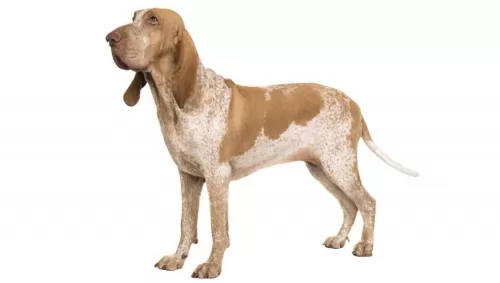 The attractive and popular breed in Italy, the Bracco Italiano was used for tracking and retrieving, evolving in Piedmont and Lombardy. It is believed the Bracco Italiano came about from crossing the Segugio with the ancient Asiatic Mastiff.
The attractive and popular breed in Italy, the Bracco Italiano was used for tracking and retrieving, evolving in Piedmont and Lombardy. It is believed the Bracco Italiano came about from crossing the Segugio with the ancient Asiatic Mastiff.
There are people however, who believe that the breed goes back to the St Hubert Hound, but it is certain that both hounds and gundogs are part of the breed’s ancestry. The dog only arrived in Britain in the last decade of the 20th century.
 Sled dog racers wanted something unique and hardy in their dogs and the Eurohound seemed to be the dog that fitted the bill.
Sled dog racers wanted something unique and hardy in their dogs and the Eurohound seemed to be the dog that fitted the bill.
It was in the 1980s that both Norway and Sweden started crossing the Husky and the Pointer for the first time.
The Eurohound, known also as the Scandinavian hound, is a cross between a German Shorthaired Pointer and an Alaskan Husky as well as other Pointer dogs.
Hailing from Norway, Scandinavia, it isn’t a purebred dog but a cross-breed, and the term ‘Eurohound’ comes from a certain Ivana Nolke so as to distinguish the European racing dogs imported into Alaska.
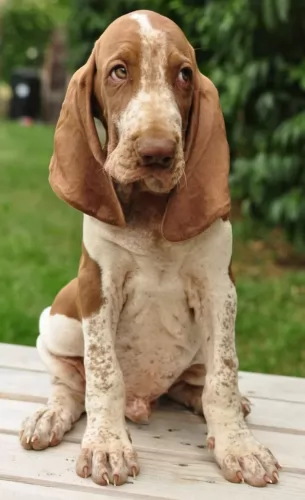 The Bracco Italiano is a large athletic, muscular dog. He stands at 58–67cm, weighing anything between 25 – 40kg. He reminds one somewhat of a German Short-haired Pointer. He has long ears and a serious expression, and this reminds one of a Bloodhound. He has short, shiny hair with his coat being white and chestnut or orange. The tail of the Bracco Italiano has always been docked, giving him an attractive, distinctive look but with rules and regulations coming in regarding docking, the long tail is often left intact. His eyes are brown.
The Bracco Italiano is a large athletic, muscular dog. He stands at 58–67cm, weighing anything between 25 – 40kg. He reminds one somewhat of a German Short-haired Pointer. He has long ears and a serious expression, and this reminds one of a Bloodhound. He has short, shiny hair with his coat being white and chestnut or orange. The tail of the Bracco Italiano has always been docked, giving him an attractive, distinctive look but with rules and regulations coming in regarding docking, the long tail is often left intact. His eyes are brown.
Braccos are wonderful pets – they are intelligent, loving, gentle and amicable, getting on well with children in the home as well as with other pets. Socialize and train them and they become gentle and obedient. They long to be involved with their human family and will adapt to life in the city or the country so long as they are made to feel like family. He is alert and makes a good watchdog. As with most other dogs, they can’t be bought, loved as a puppy and then ignored and left to themselves when they grow into adults.
 The Eurohound is a carefully bred dog considered to be a large dog standing up to 72 cm in height and weighting in the region of 18-24 kg.
The Eurohound is a carefully bred dog considered to be a large dog standing up to 72 cm in height and weighting in the region of 18-24 kg.
With its mission being to be a sled dog, it is constantly being crossbred with other cross- breeds to produce dogs to suit the pulling of sleds. Because both the Husky and Pointers have been used in its breeding, who knows really how its appearance will be as it can vary quite a bit.
There are however, some common features in the dogs such as the half dropped ears. More Eurohounds have black ears with white markings. The dog is a slender breed with a longish face and a long muzzle. Certainly it is known for being a powerful sled dog. The short, shiny dog can be in a number of colors such as cream, beige white, red, black, spotted or patched.
Social, extrovert and energetic, the Eurohound also loves to be busy. Its a dog who forms a strong relationship with its owners, being affectionate and loyal. While he is quite able to live in the city or the country, he essentially needs large premises as he loves to run and be free.
He most certainly isn’t a working dog breed who can be left on his own in the backyard until you need him to pull a sled as he craves your companionship. He is an independent and stubborn dog and therefore training and socialization will b excellent for him as it makes him understand who is boss in the home.
He is a dog who gets on well with other pets in the home as well as children.
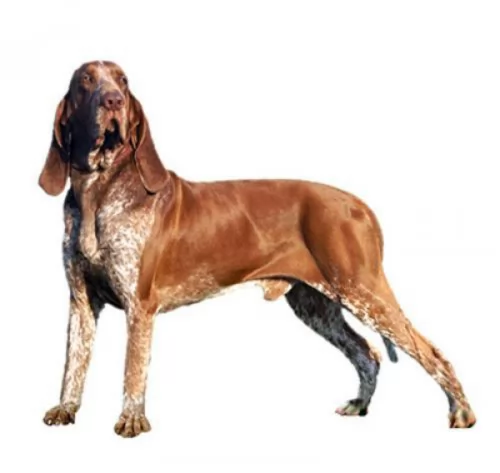 The gentle, amicable Bracco Italiano is a versatile dog that can be a super sport companion for active people and it can also be an exceptional companion for families and older people. He has a sweet, gentle expression and his amicable nature makes him easy to love. He is alert though, and therefore can be both protector and friend at the same time.
The gentle, amicable Bracco Italiano is a versatile dog that can be a super sport companion for active people and it can also be an exceptional companion for families and older people. He has a sweet, gentle expression and his amicable nature makes him easy to love. He is alert though, and therefore can be both protector and friend at the same time.
Overall, this easy going dog with his low maintenance coat can make an excellent 4-legged addition to any family.
 Full of bounce, social and extroverted, while also being independent and stubborn, the Eurohound just loves being around his human family, bonding strongly with them, whether they are adults, children or even other pets in the home.
Full of bounce, social and extroverted, while also being independent and stubborn, the Eurohound just loves being around his human family, bonding strongly with them, whether they are adults, children or even other pets in the home.
You’ll find that your Eurohound is an intelligent dog too and that he can be easily trained. He loves to be active, so to put him in your backyard and all but forget about him would be cruel. They are loyal, loving dogs who want to be part of all your activities, being ready to walk and run with you whenever the opportunity arises.
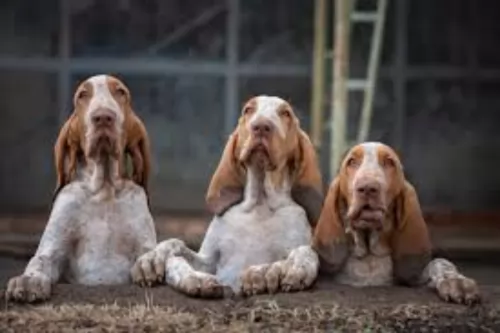 There don’t appear to be any major health issues with your Bracco Italiano and he can live to be 12, 13 or 14 years of age. Because he is a large breed however, you will need to watch out for hip dysplasia.
There don’t appear to be any major health issues with your Bracco Italiano and he can live to be 12, 13 or 14 years of age. Because he is a large breed however, you will need to watch out for hip dysplasia.
Hip dysplasia is a common skeletal disease with dogs and larger dogs have the genetic predisposition for hip dysplasia. Your dog can develop joint inflammation with pain and lameness.
Other health problems to look out for include kidney disease (Amaloidosis), cherry eye which results in dry eye. If you want to buy a Bracco Italiano, you should ask the breeder about the medical history of the parents.
 Considered as a healthy dog breed and able to live up to 10 – 15 years of age, just some of the most common reported health problems you might find with your Eurohound are hip and elbow dysplasia.
Considered as a healthy dog breed and able to live up to 10 – 15 years of age, just some of the most common reported health problems you might find with your Eurohound are hip and elbow dysplasia.
Hip dysplasia is where the joint – the ball and socket – is malformed so that instead of working smoothly it grinds. It is one of the most common skeletal diseases in dogs and large breeds are mostly affected. Hip dysplasia can lead to osteoarthritis, pain and lameness.
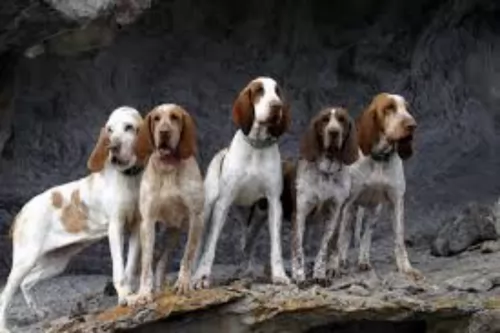 These dogs are moderate shedders so he will simply need a good brushing twice a week to ensure the coat is kept shiny and free from loose hairs. Nails should be clipped from time to time and he will also need to have his long ears checked for cleanliness. Long-eared dog breeds are more susceptible to canine ear infections.
These dogs are moderate shedders so he will simply need a good brushing twice a week to ensure the coat is kept shiny and free from loose hairs. Nails should be clipped from time to time and he will also need to have his long ears checked for cleanliness. Long-eared dog breeds are more susceptible to canine ear infections.
The Bracco is a large dog and therefore he will require a high quality, large-breed dog food formula. Your veterinarian can even recommend a quality commercially manufactured food for large, energetic dogs and which comes with all the vitamins and minerals required for such a breed.
Your vet will recommend you steer clear of foods with cheap fillers, lots of preservatives, sugar and colorants. He has a glossy, dense short coat and you want to ensure he gets raw meat, rice and vegetables from time to time to ensure that the beautiful coat never becomes dull and dry.
Cool, fresh water must always be available to him. Diet and nutrition is an important decision for your pet as it will ultimately affect his long term health.
 The Eurohound is an energetic dog who will require a high-quality nutritious food. Home made dog foods are wonderful but in the event that it isn’t always possible, make sure you buy top quality commercially manufactured food.
The Eurohound is an energetic dog who will require a high-quality nutritious food. Home made dog foods are wonderful but in the event that it isn’t always possible, make sure you buy top quality commercially manufactured food.
Your vet can advise you on the type of food to use for your pet if you are unsure. Certainly, if you feed your dog kibble, take a good look at the ingredient label on the pet food packaging. If you are interested in your dog’s health in terms of food, you will learn about protein/fat ratio and how much moisture is in the food and what vitamins are included.
Remember to occasionally include cooked brown rice, vegetables and chicken as well as some raw meat from time to time.
The Eurohound isn’t a big shedder but you will still need to ensure that you brush his short coat twice a week to keep it in tip top condition.
These are dogs which bond closely with their human family so this grooming period will be therapeutic to him.
Check his ears inside and out for the development of ear infections and brush his teeth twice a week with a special dog toothbrush and tooth paste. Dental disease can cause a host of serious illnesses and you want to avoid this with your dog,